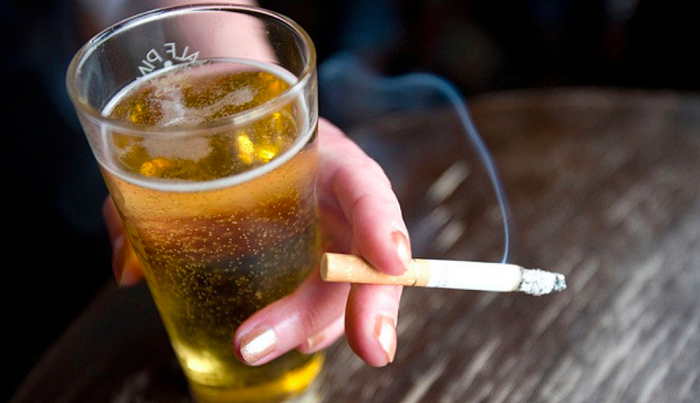When people are asked whether they smoke or not, I’ve noticed that the most common answer isn’t “yes” or “no”, but instead “only when I’m drinking”. Variations of this answer may be a cover for those who smoke a lot but don’t want to accept the title of “smoker”. Yet it does make you wonder.
There must be a reason why the combination of alcohol and cigarettes is deemed more acceptable than smoking when you’re sober. Your first thoughts may be that this is simply because alcohol lowers your inhibitions. This makes alcohol an easy target to point at after any questionable behaviour. (A fact to which many will be able to attest.)
Willpower may have something to do with it, as those who are already smokers may turn to cigarettes with more ease when they’re on a night out. However, there is an even more scientific reason why smoking and drinking go hand in hand. In fact, there are two.
This was documented in a study that took place at the University of Pennsylvania in 2009. Doctor John Dani and his team published an experiment that studied how nicotine affected the memory of mice. Basically, the nicotine tricks the brain into creating associations between smoking and our environment. Dr. Dani explains:
“Our brains normally make these associations between things that support our existence and environmental cues so that we conduct behaviors leading to successful lives. The brain sends a reward signal when we act in a way that contributes to our well being. However, nicotine commandeers this subconscious learning process in the brain so we begin to behave as though smoking is a positive action.”
Your previous intake of nicotine affects your memory of drinking. So if you smoke and drink, the next time you are drinking you remember smoking, and desire that kick once again. Dani continued:
“The brain activity change was just amazing. Compared to injections of saline, nicotine strengthened neuronal connections – sometimes up to 200 percent. This strengthening of connections underlies new memory formation.”
However, the affects are chemical as well as psychological. Separately, nicotine and alcohol can boost dopamine in your bloodstream. Dopamine is a neurotransmitter that, to put it simply, gives you a good feeling. While often short-lived, this feeling of adrenaline or general happiness can be addictive itself.
The twist is that together, alcohol and nicotine do the opposite. If you decide to smoke while you drink, your dopamine levels drop and you can become stressed or unhappy. Without realising it, you want to bring those levels back up, so you take out another cigarette.
This creates a vicious cycle, where the nicotine-alcohol cocktail is causing the problem you’re hoping it will solve. This is why we are often not satisfied with just one, and can end up chain-smoking when we drink. The solution is simple, but not the easiest: don’t smoke in the first place.
Read more: viralthread












